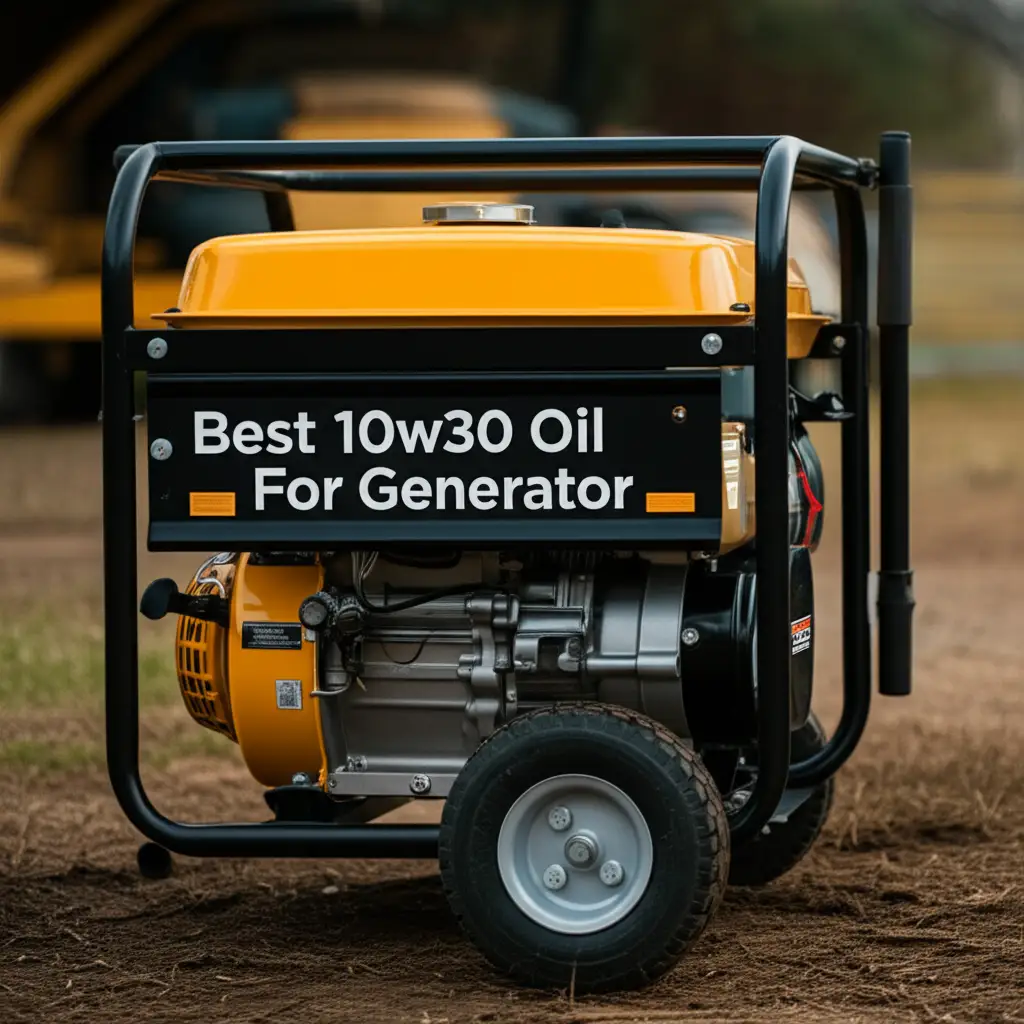· Mason Everett · Generator Maintenance · 19 min read
Best 10w30 Oil For Generator

Best 10w30 Oil for Generator Performance and Longevity
Have you ever considered what makes your generator run smoothly, especially when you need it most? The secret often lies deep within its core: the engine oil. Just like blood keeps our bodies healthy, the right oil keeps your generator’s engine protected and performing optimally. Choosing the best 10w30 oil for generator use is not just a preference; it is a critical decision for its lifespan and efficiency.
Many generator owners overlook the importance of specific oil requirements. Using the wrong type can lead to poor performance, increased wear, and costly repairs. This comprehensive guide will walk you through everything you need to know about selecting the ideal 10W-30 engine oil for your generator. We will explore oil types, viscosity explained, top brands, and crucial maintenance tips. Let us ensure your generator is always ready to power your home or worksite.
Takeaway:
- Understanding 10W-30: This oil grade is ideal for many generators, especially in moderate climates.
- API Service Class: Always match the oil’s API rating (e.g., SN, SP) to your generator manufacturer’s recommendations.
- Synthetic vs. Conventional: Synthetic 10W-30 offers superior protection and longer change intervals but costs more.
- Regular Maintenance: Timely oil changes and proper disposal are vital for generator longevity and engine health.
- Manufacturer Guidelines: Always follow your generator’s manual for the correct oil type and change schedule.
The best 10W-30 oil for your generator typically depends on its manufacturer’s specifications, the operating climate, and the engine type. Look for a high-quality synthetic or synthetic-blend oil with an API service rating of SN, SP, or higher, designed for small engines or automotive use, to ensure optimal protection and performance.
Understanding 10W-30 Oil Viscosity for Generators
When we talk about engine oil, viscosity is a key factor. It describes the oil’s resistance to flow, which changes with temperature. The “10W-30” designation on an oil bottle tells us two important things about its viscosity.
The “10W” part refers to the oil’s viscosity at cold temperatures, the “W” stands for winter. A lower number here means the oil is thinner when cold. This allows it to flow easily during cold starts, ensuring rapid lubrication to engine parts. Good cold flow is crucial for protecting your generator’s engine from wear, especially during initial startup.
The “30” part indicates the oil’s viscosity at higher operating temperatures. A higher number means the oil remains thicker when hot. This ensures a strong protective film around moving parts when the engine is running and generating heat. Balancing these two numbers means 10W-30 oil offers a good compromise. It provides excellent cold start protection while maintaining sufficient thickness at operating temperatures. This makes it a popular choice for many types of generators.
This multi-grade oil adapts to varying temperatures. It flows like a 10-weight oil when cold and like a 30-weight oil when hot. This adaptability is what makes 10W-30 suitable for a wide range of climates and generator uses. It ensures your engine is protected whether you are starting it in chilly weather or running it for hours in moderate conditions.
Key Factors in Choosing the Best 10W-30 Generator Oil
Selecting the right oil goes beyond just checking the “10W-30” label. Several other factors play a crucial role in determining the best 10w30 oil for generator use. Ignoring these can lead to premature engine wear. I always advise people to look carefully at these specifications before buying.
First, always consult your generator’s owner’s manual. The manufacturer’s recommendations are paramount. They have designed the engine and tested specific oil types and grades that perform best for that particular model. Deviating from these recommendations can void your warranty or cause serious damage. This manual will often specify the API service class required.
Second, consider the API service class. This classification system, established by the American Petroleum Institute, indicates the oil’s quality and performance standards. For gasoline engines, the classification begins with “S” followed by another letter (e.g., SA, SB, SC, SD, SE, SF, SG, SH, SJ, SL, SM, SN, SP). Newer classifications like SN or SP offer better protection against engine wear, sludge, and piston deposits. Always choose an oil with the latest API rating that meets or exceeds your generator’s requirements.
Third, think about your operating environment and frequency of use. If you use your generator frequently or in extreme conditions, a full synthetic 10W-30 might be a better investment. Synthetic oils offer superior thermal stability and breakdown resistance compared to conventional oils. They protect better under stress and can extend oil change intervals. For occasional use in moderate climates, a high-quality conventional or synthetic blend 10W-30 might suffice.
Top 10W-30 Oil Brands and Types for Generators
When searching for the best 10w30 oil for generator applications, certain brands consistently rise to the top due to their proven quality and performance. These brands invest heavily in research and development to produce oils that meet strict industry standards and often exceed them. Choosing a reputable brand ensures you are getting a product designed for engine protection. I have found great success with several of these in my own generator maintenance.
Many major oil manufacturers offer excellent 10W-30 formulations suitable for generators. Brands like Mobil 1, Valvoline, Castrol, and Pennzoil are well-regarded for their automotive and small engine oils. Within these brands, you will often find various types of 10W-30 oil: conventional, synthetic blend, and full synthetic. Each type offers different levels of protection and benefits.
Types of 10W-30 Generator Oil:
- Conventional 10W-30: This is traditional petroleum-based oil. It is the most affordable option and provides adequate lubrication for many older or less demanding generator engines. It requires more frequent oil changes. This type of oil is a good choice for generators used occasionally in moderate temperatures.
- Synthetic Blend 10W-30: This oil mixes conventional oil with synthetic base stocks. It offers improved performance over conventional oil, including better temperature stability and wear protection, at a moderate price. Synthetic blends are a solid mid-range option for regular generator use.
- Full Synthetic 10W-30: Made from 100% synthetic base stocks, this oil provides the highest level of protection. It excels in extreme temperatures, resists breakdown, and reduces engine wear significantly. Full synthetic oils are ideal for generators used frequently, under heavy loads, or in very hot or cold climates. While more expensive, they can extend engine life and may allow for longer oil change intervals.
When selecting a brand, look for specific products marketed for “small engines,” “generators,” or “power equipment.” These formulations often contain additives tailored to the unique demands of these engines. They may have enhanced anti-wear agents or detergents. Always confirm the API service rating matches your generator’s requirements, ensuring compatibility and optimal engine health.
Why Regular Oil Changes Matter for Your Generator
Regular oil changes are not just a suggestion; they are a fundamental part of proper generator maintenance. The engine oil in your generator works tirelessly to lubricate moving parts, dissipate heat, and carry away contaminants. Over time, this oil degrades and becomes less effective. Understanding why timely oil changes are so crucial can save you from costly repairs and extend your generator’s life.
As your generator runs, the oil becomes contaminated with various byproducts. These include microscopic metal particles from normal engine wear, combustion byproducts like carbon and soot, and even moisture. These contaminants turn the oil into an abrasive sludge that can damage internal engine components. Additionally, the oil’s chemical additives, which provide properties like anti-wear and anti-corrosion, break down over time due to heat and stress. This loss of additive effectiveness reduces the oil’s ability to protect the engine.
When oil degrades, its viscosity changes. It can become too thin at operating temperatures, failing to provide an adequate protective film. Conversely, it can become too thick when cold, hindering proper lubrication during start-up. Inadequate lubrication leads to increased friction, which generates more heat and causes accelerated wear on critical engine parts like pistons, cylinders, and bearings. This wear eventually leads to reduced performance, increased fuel consumption, and ultimately, engine failure.
Most generator manufacturers provide a recommended oil change schedule in the owner’s manual. This schedule is typically based on hours of operation or a specific time period, such as annually, whichever comes first. For example, a common recommendation might be an oil change every 50-100 hours of operation or at least once a year. Adhering strictly to this schedule is vital. It ensures your engine always has fresh, clean, and effective lubrication. This proactive maintenance step is simple yet profoundly impactful.
Synthetic vs. Conventional 10W-30 Oil for Generators
When choosing the best 10w30 oil for generator use, a common dilemma arises: should you opt for synthetic or conventional oil? Both types are available in the 10W-30 grade, but they differ significantly in their composition, performance, and cost. Understanding these differences helps you make an informed decision based on your generator’s needs and your budget.
Conventional 10W-30 oil is derived directly from crude petroleum. It undergoes refining processes to remove impurities and create a basic lubricant. While effective, its molecular structure is less uniform compared to synthetic oil. This can make it more susceptible to thermal breakdown and oxidation, especially under high stress or extreme temperatures. Conventional oil is generally sufficient for generators used intermittently or in moderate climates, and it comes at a lower price point. It provides good basic lubrication and protection.
Full synthetic 10W-30 oil, on the other hand, is engineered from scratch using advanced chemical processes. Its base oils are more uniform in molecular size and shape. This precise structure gives synthetic oils superior properties. They offer exceptional thermal stability, meaning they resist breaking down at high temperatures and remain fluid in extreme cold. Synthetic oils also provide better wear protection, reduce friction, and keep engine components cleaner due to their advanced additive packages. This translates to extended engine life and potentially longer oil change intervals.
The choice between synthetic and conventional often boils down to performance vs. cost. Synthetic oil offers superior protection, especially for generators that see heavy use, run in harsh environments, or are critical for backup power. It can justify its higher price through enhanced engine longevity and reduced maintenance over time. For light, occasional use in stable conditions, conventional oil can be perfectly adequate. Some generators may also benefit from a “synthetic blend” 10W-30, which combines the benefits of both at a mid-range price. Ultimately, always prioritize your generator’s manual for specific oil recommendations, but consider upgrading to synthetic if your usage demands it.
Tips for Proper Generator Oil Maintenance and Spill Management
Proper oil maintenance extends beyond just knowing which oil to use; it involves good habits for checking, changing, and managing oil. Maintaining your generator’s oil correctly ensures its long-term reliability. I have learned over the years that these small steps make a big difference. Ignoring these can lead to messy situations and engine problems.
Regularly check your oil level. Before each use, or at least monthly if stored, check the oil dipstick. Make sure the oil level is between the “add” and “full” marks. Running your generator on low oil can cause severe engine damage due to insufficient lubrication. If the level is low, add more of the same type of 10W-30 oil you are already using. Do not mix different types unless specified by the manufacturer.
When it comes time for an oil change, make sure you have the right tools and a plan for collection. You will need a wrench to remove the drain plug, an oil pan to catch the old oil, and a funnel for adding new oil. Always drain the oil when the engine is warm (but not hot) as it flows more easily. Ensure a clean workspace to avoid introducing contaminants into the engine.
Essential Oil Maintenance Practices:
- Follow the Schedule: Adhere strictly to the manufacturer’s recommended oil change intervals, whether based on hours or time.
- Use the Right Tools: Have an oil pan, wrench, and funnel ready for oil changes.
- Warm Engine Draining: Drain old oil when the engine is warm for better flow.
- Inspect Old Oil: Look at the color and consistency of the drained oil. Very dark, sludgy oil indicates it was due for a change or that there are other engine issues.
- Replace Filters: Change the oil filter (if your generator has one) with every oil change. A clogged filter cannot effectively remove contaminants.
Spill management is also a critical part of oil maintenance. Accidents happen, and oil spills can be messy and environmentally harmful. Always have absorbent materials like old rags, kitty litter, or specialized oil absorbent pads on hand. If you spill oil on a hard surface, clean it immediately to prevent slips and stains. For larger spills, contain the area and use absorbents to soak up the oil. Proper cleanup prevents environmental contamination. If you get oil on fabrics, there are ways to clean it effectively. For example, knowing how to get oil out of a washing machine can be useful for soiled rags. Also, if oil gets on your carpet, understanding how to get gear oil out of carpet or what soap can clean oil from carpets can be very helpful. Remember that proper disposal of waste oil is also important.
Environmental Considerations and Oil Disposal
Taking care of your generator involves not just its internal workings but also how you manage its waste products. Engine oil is a hazardous material, and improper disposal can severely harm the environment. After you perform an oil change with your chosen best 10w30 oil for generator, responsible disposal is your next important step. I always make sure to follow environmental guidelines closely.
Never pour used engine oil down a drain, into the ground, or into regular trash. A single quart of motor oil can contaminate hundreds of thousands of gallons of fresh water. It contains heavy metals and other toxic compounds from engine wear and combustion. These contaminants can leach into soil and groundwater, affecting ecosystems and potentially human health. Responsible disposal protects our natural resources.
The good news is that used engine oil is highly recyclable. Many auto parts stores, service stations, and municipal waste facilities offer free oil recycling programs. Collect your used oil in a clean, sealed, leak-proof container, such as the original oil container or a dedicated plastic jug. Make sure not to mix it with other automotive fluids like antifreeze or brake fluid, as this can make recycling difficult or impossible. Call ahead to your local recycling center or auto parts store to confirm their acceptance policies.
By recycling your used oil, you contribute to a sustainable cycle. Recycled oil can be re-refined into new lubricants, heating oil, or other petroleum-based products. This reduces the need for new crude oil extraction, conserving energy and natural resources. It also prevents harmful pollution. Being a responsible generator owner includes environmental stewardship. Every small action, like proper oil disposal, adds up to a larger positive impact on our planet.
Factors Affecting 10W-30 Oil Performance in Generators
The performance of your chosen 10W-30 oil in a generator is not static; it is influenced by several external and internal factors. Understanding these helps you anticipate how your oil will behave and when it might need attention. I often remind people that oil is the lifeblood, and its condition is key.
Ambient temperature plays a significant role. While 10W-30 is designed for a range of temperatures, extreme cold or heat can still push its limits. In very cold conditions, even a 10W “winter” rating might struggle slightly, leading to slower cold starts. Conversely, in very hot environments, the “30” hot viscosity might thin out more than ideal, reducing the oil film strength. Always consider your local climate. Manufacturers often provide charts in the manual indicating the best oil viscosity for different temperature ranges.
The workload on your generator also impacts oil performance. A generator running continuously at or near its maximum load will cause the oil to work harder. This increased stress leads to higher operating temperatures and accelerated breakdown of the oil’s additives. Engines under heavy load generate more heat and combustion byproducts, contaminating the oil faster. If you use your generator for extended periods or for demanding tasks, more frequent oil changes might be necessary, even if the manufacturer’s schedule seems longer.
Engine design and age are other important considerations. Older engines might have wider internal tolerances or accumulate more sludge, which can affect oil circulation and cleanliness. Some older engines might even have different API requirements. Modern generator engines are often designed with tighter tolerances and require higher quality oils to achieve optimal performance and fuel efficiency. The type of fuel used can also subtly affect oil. For example, ethanol in gasoline can sometimes contribute to moisture accumulation in the oil, potentially affecting its lubricating properties over time. Being aware of these factors helps you tailor your oil maintenance strategy for maximum generator health.
Maintaining Optimal Fuel Efficiency with the Right Oil
Beyond just protecting the engine, the right 10w30 oil for generator use also contributes significantly to maintaining optimal fuel efficiency. Many people overlook this benefit, but a well-lubricated engine runs more smoothly and uses less fuel. It is an important aspect of overall generator economy.
Engine oil reduces friction between moving parts. When friction is minimized, the engine does not have to work as hard to overcome internal resistance. This means less energy is wasted as heat and more energy is converted into useful power. High-quality 10W-30 oil, especially synthetic formulations, excels at reducing friction. It maintains a consistent lubricating film even under high pressure and temperature. This efficiency gain, while seemingly small per hour, adds up over hundreds of hours of operation.
As oil degrades and becomes contaminated, its ability to reduce friction diminishes. Old, sludgy oil increases internal drag within the engine. This forces the engine to burn more fuel to produce the same amount of power. It is like trying to run with sticky shoes on; you use more energy for the same distance. Fresh, clean oil keeps the engine components moving freely, allowing them to operate at their designed efficiency.
Regular oil changes with the correct 10W-30 oil are a direct investment in your generator’s fuel economy. By keeping the engine components properly lubricated and clean, you ensure that the generator converts fuel into electricity as efficiently as possible. This not only saves you money on fuel costs but also reduces emissions and extends the life of your generator. Pairing the right oil with other maintenance like clean air filters will further enhance fuel efficiency.
Frequently Asked Questions About 10W-30 Generator Oil
Is 10W-30 oil good for all generators?
No, 10W-30 oil is not ideal for all generators. While it is a common choice for many air-cooled, gasoline-powered generators, especially in moderate climates, always check your owner’s manual. Some generators may require different viscosity grades like 5W-30 for colder climates or straight 30-weight oil for hotter conditions. The manufacturer’s recommendation is always the best guide.
Can I mix synthetic and conventional 10W-30 oils?
Mixing synthetic and conventional 10W-30 oils is generally not recommended. While it may not cause immediate damage, it can dilute the benefits of the synthetic oil. Synthetic blend oils are designed to mix specific synthetic and conventional base oils. For best performance and protection, stick to one type of oil (either full synthetic, synthetic blend, or conventional) and the same brand if possible.
How often should I change 10W-30 oil in my generator?
The oil change frequency for 10W-30 in your generator depends on its usage hours and the manufacturer’s recommendations. Most generators require an oil change every 50-100 hours of operation or at least once a year, whichever comes first. If your generator sees heavy use, operates in dusty conditions, or experiences extreme temperatures, more frequent changes might be necessary.
What does API SN or SP mean for generator oil?
API SN or SP refers to the American Petroleum Institute (API) service classification for gasoline engine oils. “SN” and “SP” are the most recent and highest quality ratings, indicating that the oil meets stringent performance standards. Oils with these ratings provide superior protection against engine wear, sludge, and piston deposits, which is beneficial for your generator’s engine longevity and performance.
Can I use car engine oil in my generator?
Yes, in many cases, you can use car engine oil in your generator, provided it is the correct viscosity (like 10W-30) and meets or exceeds your generator’s required API service classification (e.g., SN or SP). Many small engines in generators use similar lubrication principles to car engines. However, always consult your generator’s manual to ensure compatibility and prevent potential issues.
What happens if I use the wrong oil viscosity in my generator?
Using the wrong oil viscosity can lead to engine problems. If the oil is too thin, it may not provide adequate lubrication at operating temperatures, leading to increased wear and overheating. If it is too thick, it can cause hard starting in cold weather and reduce fuel efficiency because the engine has to work harder to circulate the oil. Always use the viscosity recommended by your generator’s manufacturer.
Conclusion
Choosing the best 10w30 oil for generator use is a vital step in ensuring your machine operates reliably and efficiently for years to come. We have explored the nuances of 10W-30 viscosity, the importance of API service classes, and the benefits of synthetic versus conventional oils. Remember that the manufacturer’s recommendations in your generator’s owner’s manual should always be your primary guide. Prioritizing oil quality and adhering to a strict maintenance schedule are the most impactful actions you can take.
Regular oil changes with the correct 10W-30 oil will not only protect your generator’s engine from premature wear but also contribute to its fuel efficiency and overall performance. Do not forget the importance of proper oil disposal, as it protects our environment. By taking these steps, you are investing in the longevity and readiness of your power source. Now, empower your generator with the right oil, and keep it running smoothly for when you need it most. Check your generator’s manual today and upgrade its oil if necessary!





